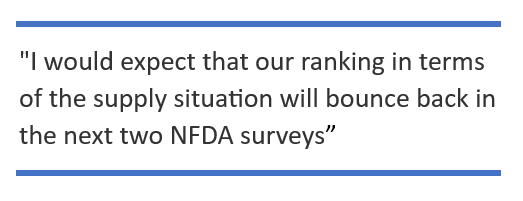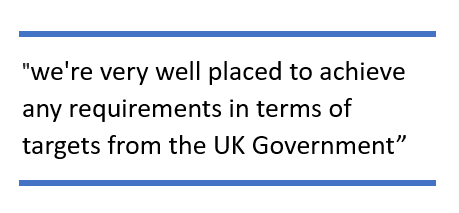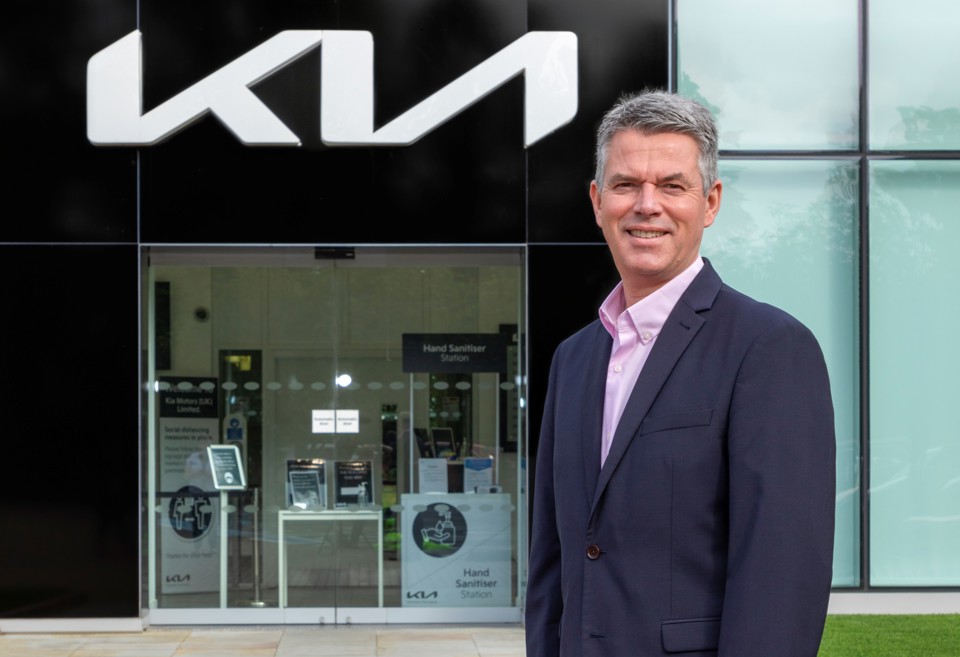The latest SMMT figures for September demonstrate the depth and breadth of Kia UK’s outstanding sales performance - the fourth best brand in terms of both month and year to date, with 89,953 cars sold so far this year - representing a 6.2% market share.
KIA UK in fact achieved the most registrations in September ever recorded (16,906), 245 more than the previous best in 2021 with the most EV registrations in any month (2,972) - over 500 more than the previous best month of EV registrations recorded in September 2022
AM spoke to Paul Philpott, president and CEO, Kia UK, about the business' thriving relationships with its many dealer partners, the quality of which has been confirmed by the latest NFDA Dealer Attitude Survey.
The latest SMMT figures for September demonstrate the depth and breadth of Kia UK’s outstanding sales performance - the fourth best brand in terms of both month and year to date, with 89,953 cars sold so far this year - representing a 6.2% market share.
KIA UK in fact achieved the most registrations in September ever recorded (16,906), 245 more than the previous best in 2021 with the most EV registrations in any month (2,972) - over 500 more than the previous best month of EV registrations recorded in September 2022
AM spoke to Paul Philpott, president and CEO, Kia UK, about the business' thriving relationships with its many dealer partners, the quality of which has been confirmed by the latest NFDA Dealer Attitude Survey.
Congratulations on your success in the latest NFDA Dealer Attitude Survey. Your success comes very much as a repeat performance as you ranked very highly last time. How do you manage to maintain your status at the top?
For me, the partnership between the manufacturer and the dealer network is really important and what the twice-yearly NFDA dealer satisfaction survey gives us is a barometer - versus all the other brands and their franchise relationships - as to how we are doing so it's a really important survey for us.
This is the 14th consecutive survey that we've been a top three brand and this time, we are the outright winner in all of the most important question areas and overall winner with 9.5 out of 10.
There's a number of parts to why have we risen to the top, one of which is we're very consistent in our approach: how we communicate with all of our dealer partners. We've got a great range of dealer partners from the very small to the big plcs but we treat them all with respect. We listen to their views, we take on board their views. We don't always agree with all their views but we find the best way forward together.
Communication is essential, whether it's from myself at the top, or whether it's from field teams, or whether it's even our technical support lines - all form elements of a strong partnership between us and our dealers.
The most important number that I've seen from the survey is that nearly 80% of our dealers responded, which says this isn't just some small sample. This is four-fifths of our entire network and we achieved an overall 9.5 out of 10 score. We were ranked the top brand in 20 out of 55 questions, and there were 30 or so brands covered in the survey. The detail of it is also important too because we can look at the areas that aren't quite as strong and put some more resources there.

One of the areas in which you ranked highly was your approach to future retail relationships. Could you explain your strategy going forwards?
We are as a brand not going forward with an agency relationship – we’re sticking to the more traditional franchise agreements. And in fact, we've just - given the changes to the block exemption regulation that sits behind the requirement to change dealer agreements - re-signed the entire network on new agreements that takes us through to the end of this decade.
Could your success here be due to Kia’s commitment to maintaining a more traditional business model?
I wouldn't necessarily like to conclude that but what all dealers want is a profitable business, a consistent business with a clear future. We're asking them to roll out new branding and new global store concept, which involves about an average £250,000 investment by each Kia dealership. They need certainty about the future and they need confidence about the people that they deal with. And that's why in part, the NFDA survey is important because it says the dealers trust us, respect us, and have confidence in our future.
New vehicle supplies didn't rank quite as well as other areas. How are you going to tackle that?
Obviously, supply chains globally have been more challenging. We take about 50% of our cars from our production plants in Korea, the other 50% come from our European production plant in Slovakia. We have enjoyed a very strong level of demand so we've been running with a much longer order bank than before COVID and that's taken a bit of adapting
Traditionally, if I went back five years, if someone took an order for a car in a showroom, within about two weeks they could probably have that car delivered. Today, on some car lines, we've got six-month, nine-month lead times and therefore there’s a different discussion with the customer.
It's then about being absolutely on top of the supply chain and production process and making sure that we give the dealers at any time the best possible information on when and which cars are coming through so that they can then have that dialogue with confidence with their customers.
 Supply is improving though. I would expect that the supply situation in the two NFDA surveys next year our ranking will bounce back a bit but it's certainly been a difficult 12 months in terms of supply. Longer lead times are however good in one sense in that, dealers would have to provide less incentive or less discount to the customer because they have the confidence that they have their order in the bank. It is however a frustration when cars get delayed or production gets changed and it's an area of continual focus.
Supply is improving though. I would expect that the supply situation in the two NFDA surveys next year our ranking will bounce back a bit but it's certainly been a difficult 12 months in terms of supply. Longer lead times are however good in one sense in that, dealers would have to provide less incentive or less discount to the customer because they have the confidence that they have their order in the bank. It is however a frustration when cars get delayed or production gets changed and it's an area of continual focus.
Your performance in terms of profit return for your dealer partners was superb. What assurance can you give dealers that that will continue?
What is important about the profit return that dealers are making, it doesn't come just from one area. So if all of our profits were coming from new car sales and not much from parts and accessory or after sales and not much from used cars, I'd be much more worried
But each area of the business is generating good and improving profit for each dealer. One of the things that drives new and used car profitability is how good your products are vis-à-vis everyone else's.
And we have a very busy next few years in terms of new product introductions, particularly around electric vehicles. We will have seven electric vehicle cars by 2027 and we need to work with the dealer network to ensure that the profit returns on electric vehicles are as good as they have historically been on ICE vehicles.
There are going to be a huge number of EVs out there from which to choose. How is KIA going to encourage people to consider one of its EVs?
I think our product range is as good as any if not better, and it will just get better and better over the next three years. We're ahead of the curve now and that's where we intend to be as a leader in electrification. But it's not just about product. It's about the service that each dealer gives to customers.
Customers want the confidence that they really understand what moving from a petrol car to electric vehicle will mean and the key point of contact is when they're face to face with a salesman in a showroom.
That salesman must be something of an evangelist for EVs, really enthusiastic, and even if the customer then decides that now is not the right time for them to change from a petrol to an electric vehicle, when they next come back to in two or three years’ time and change their car again, they'll say “I remember you being really passionate about electric vehicles last time around, perhaps now's a good time to talk”.
How would you support that evangelism as a lot of dealers say they lack the support of manufacturers in terms of EV charging for example?
A lot of it is firstly about marketing materials and assets that customer-facing staff can refer to in the showroom. So we've got Digital Point of Sale, we've got the showcase system where the salesman can talk through the different elements of an EV. We're also investing in a new academy training centre in Derby that will be state-of-the-art. Next year, we’ll have an EV master class in all customer-facing communication. You talk about the need to stay ahead of new and evolving challenges. What keeps you awake at night?
You talk about the need to stay ahead of new and evolving challenges. What keeps you awake at night?
We've only just seen the final details of the government's zero emission vehicle mandate, despite it coming into force on January 1 next year which sees us being required to move from where we are today - which is about 16 to 17% of EVs in the mix - to 80% by 2030.
That's a pretty significant rate of climb and the fines if we don't get there are unsustainable so we have to get there through a mixture of having fantastic products, but also communicating effectively with customers and ensuring that showrooms across the country become the best place to buy an electrified car from Kia.
What was your first reaction when you heard about the UK’s decision to delay the 2030 ban on manufacturing petrol and diesel vehicles?
I was a bit ambivalent about it really because we always knew that there was some uncertainty as to whether hybrids and plug in hybrids could be sold in the five-year period between 2030 and 2035. We could have got ourselves ready for 2030 although the delay gives us a bit more flexibility to continue to serve customers what they want.
Some customers will not be immediately wanting to move to an EV for a number of reasons and therefore to be able to continue to sell them ‘stepping stone’ powertrains is actually quite useful but certainly electric vehicles are the future and I think we're very well placed to achieve any requirements in terms of targets from the UK Government.
Login to continue reading
Or register with AM-online to keep up to date with the latest UK automotive retail industry news and insight.













Login to comment
Comments
No comments have been made yet.